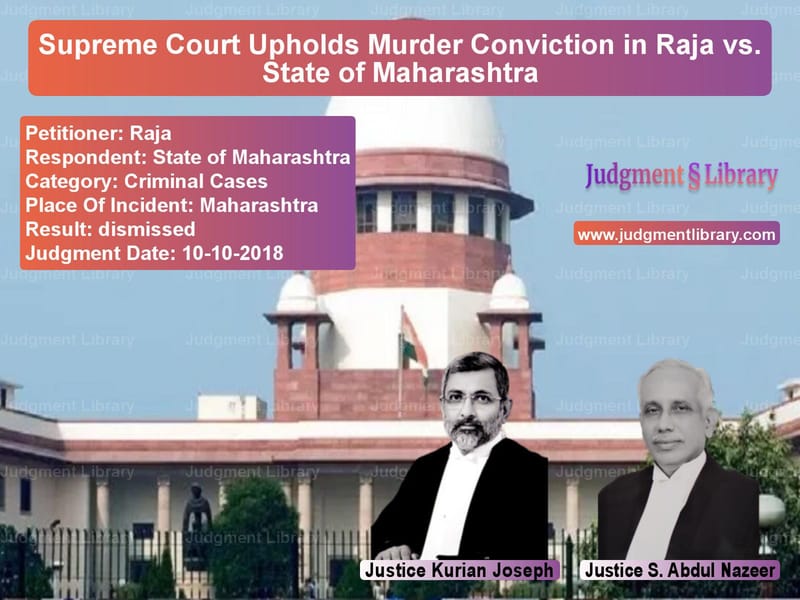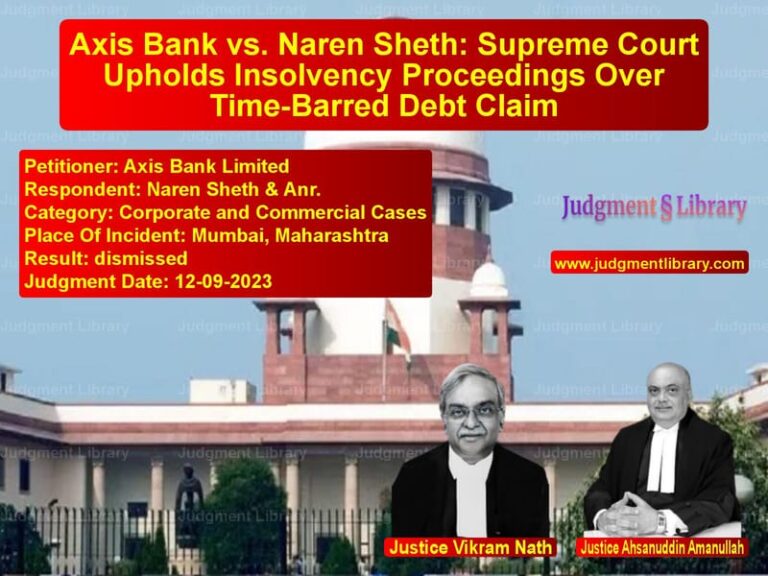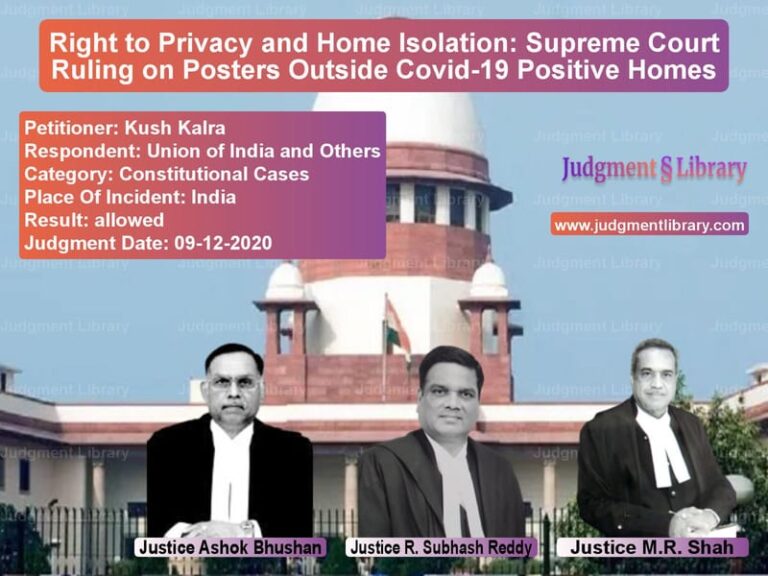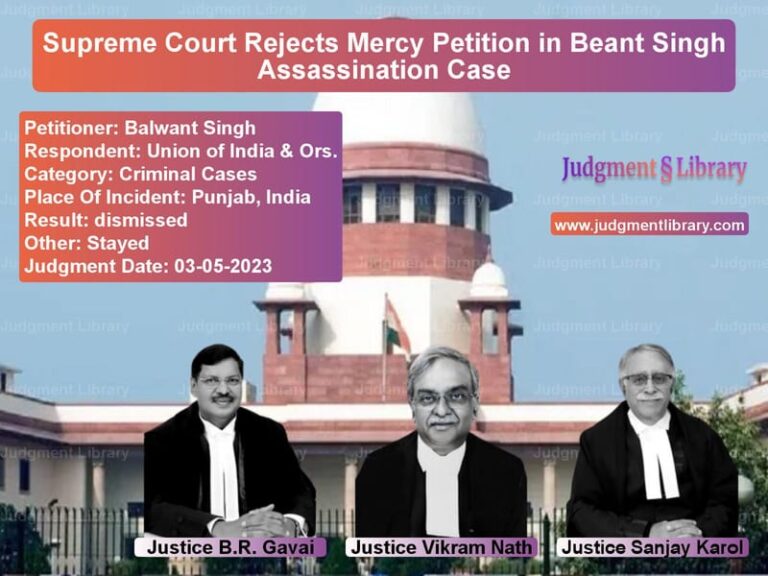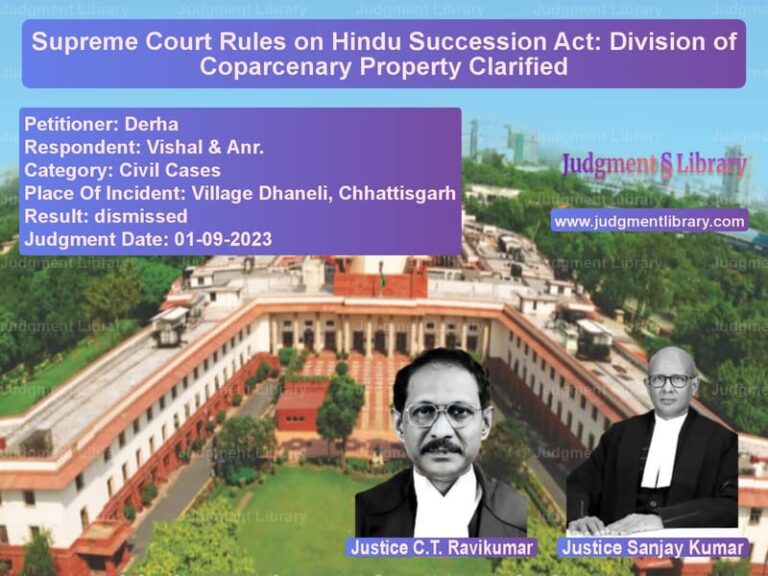Supreme Court Upholds Murder Conviction in Raja vs. State of Maharashtra
The Supreme Court of India, in the case of Raja vs. State of Maharashtra, upheld the conviction of the appellant under Section 302 of the Indian Penal Code (IPC). The case revolved around the brutal murder of the appellant’s real brother, Santosh. The conviction was primarily based on circumstantial evidence, an extra-judicial confession, and the recovery of evidence linked to the crime.
Background of the Case
The appellant, Raja, was accused of murdering his real brother, Santosh. The prosecution relied heavily on circumstantial evidence, since there were no eyewitnesses to the crime. The trial court convicted the appellant, and the conviction was later upheld by the High Court.
The Supreme Court was approached to reconsider the conviction, primarily on the grounds that the prosecution’s evidence was insufficient and that the appellant had already served 11 years in jail.
Key Legal Issues
- Whether the conviction based on circumstantial evidence and extra-judicial confession was legally sustainable.
- Whether the prosecution had ruled out the possibility of another person committing the murder.
- Whether the appellant, having served a substantial period of his sentence, was entitled to premature release.
Arguments by the Appellant
- The prosecution failed to produce any direct evidence against him.
- The trial court and the High Court relied excessively on circumstantial evidence and extra-judicial confession.
- The confession made before PW-1 and corroborated by PW-2 should not have been relied upon, as it was not made before a judicial magistrate.
- The possibility of another person committing the crime was not adequately examined.
- Having already served 11 years in prison, the appellant pleaded for leniency.
Arguments by the State (Respondent)
- The extra-judicial confession was voluntary and consistent with the evidence collected.
- The recovery of evidence linked to the crime further supported the prosecution’s case.
- Both the trial court and the High Court had meticulously examined all the evidence before convicting the appellant.
- The possibility of another person committing the crime had been conclusively ruled out.
Supreme Court’s Observations
The Supreme Court, after carefully considering the submissions and evidence, made the following key observations:
- “The possibility of any other person causing the death of the victim-Santosh by inflicting fatal injuries has been totally ruled out.”
- “Both the Trial Court and the High Court have meticulously considered the entire evidence and have addressed the issues.”
- “Every finger points only to the appellant.”
- “There is no reason at all to take a different view.”
Final Judgment
The Supreme Court upheld the conviction and dismissed the appeal. However, in view of the appellant having already served 11 years in jail, the Court made a special direction:
- The State was directed to consider the appellant’s case for premature release upon completion of 14 years, including remission.
- If there was any delay in making the decision, the appellant was to be released on self-bond upon completing 14 years, unless required to be detained in another case.
Implications of the Judgment
The ruling carries several important implications:
- Reliability of Circumstantial Evidence: The judgment affirms that circumstantial evidence, if strong and conclusive, can form the basis of conviction.
- Validity of Extra-Judicial Confession: The Court reinforced that extra-judicial confessions, if corroborated, are admissible and can be relied upon.
- Judicial Review of Premature Release: The Court exercised discretion in directing the State to consider premature release after 14 years, balancing justice with rehabilitation.
Conclusion
The Supreme Court’s judgment in Raja vs. State of Maharashtra underscores the principle that a conviction based on circumstantial evidence and extra-judicial confession can be legally sustainable. While upholding the conviction, the Court also recognized the appellant’s right to seek premature release, thereby balancing judicial rigor with considerations of rehabilitation.
Petitioner Name: Raja.Respondent Name: State of Maharashtra.Judgment By: Justice Kurian Joseph, Justice S. Abdul Nazeer.Place Of Incident: Maharashtra.Judgment Date: 10-10-2018.
Don’t miss out on the full details! Download the complete judgment in PDF format below and gain valuable insights instantly!
Download Judgment: Raja vs State of Maharashtra Supreme Court of India Judgment Dated 10-10-2018.pdf
Direct Downlaod Judgment: Direct downlaod this Judgment
See all petitions in Murder Cases
See all petitions in Bail and Anticipatory Bail
See all petitions in Judicial Review
See all petitions in Judgment by Kurian Joseph
See all petitions in Judgment by S. Abdul Nazeer
See all petitions in dismissed
See all petitions in supreme court of India judgments October 2018
See all petitions in 2018 judgments
See all posts in Criminal Cases Category
See all allowed petitions in Criminal Cases Category
See all Dismissed petitions in Criminal Cases Category
See all partially allowed petitions in Criminal Cases Category

